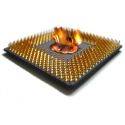Computerware Blog
Is Your CPU Burning Out?
Common Hardware Issues
You'll probably be able to tell that the CPU in a computer is going bad the second you turn your computer on. Your computer will completely seize up or fail to boot up properly. Occasionally, if your computer does manage to turn itself on, it will freeze right up after a few moments. A key thing to look for is whether the fans are moving at full capacity or not. If they are, and nothing is happening with your screen, you've got yourself a faulty CPU. There is also the infamous "blue screen of death" (the system halt errors), which will tell you if the processor isn't working properly. In addition, listen for beeps coming from your computer. If it is completely silent, then it could be likely that your CPU has malfunctioned.
Be Wary of Power Outages
If there have been intense storms in your area, your CPU problems might be the result of a power surge. Just like any other piece of hardware, too much power directly into the system can cause irreparable damage. When lightning rains down from the sky and strikes your building, your computer may be forced to reboot. This disruption will likely be the reason your CPU would incur damages. Unfortunately, there isn't much that can be done if this is the cause, and the CPU will need to be replaced.
But What About My Data?
That's where Computerware can help. Your CPU doesn't store any data, but if you are working on something when disaster strikes, you'll lose your progress. That's why you should save often. In the event of a power outage, unplug your computer and wait for the power to come back on before plugging it back in. The best way your PC can be protected is by using a Computerware-approved uninterrupted power supply (UPS). A UPS controls the power flowing to and from electronics, and it is equipped with a battery to provide power even if there is an outage! Computerware can provide you with the UPS device your company needs.
Too Hot For Words
People change with the weather – if it gets too hot, they become sluggish. The same thing happens to computers. The number one cause for CPU failure is too much heat. The CPU processes huge amounts of instructions at a lightning-quick rate, and this naturally leads to an overabundance of heat energy. While most CPU's have their own internal cooling systems, they can die out with age as well. The CPU's temperature should always remain safely below 50 degrees Celsius. Otherwise, permanent damage could result, to both your computer and your wallet. Typically the fans installed inside your PC will do the trick, but you'll want to make sure your computer has some room to breathe and doesn't collect too much dust.
The best way to prevent this damage is by contacting Computerware, and taking advantage of the IT services we provide, such as proper PC maintenance and remote monitoring. We'll make sure your CPU isn't pushing itself to the limit and endangering both your business and your livelihood. With our remote IT support, we'll fix your issues before they turn into expensive problems. Give us a call at (703) 821-8200 – your computer's brain is on the line.


Comments